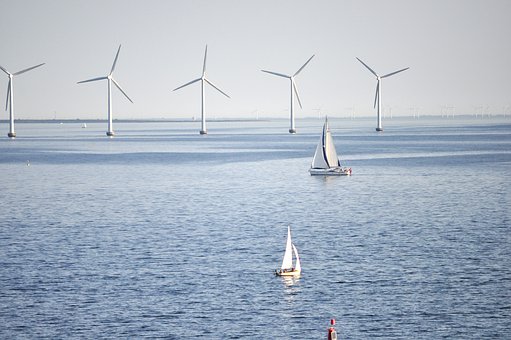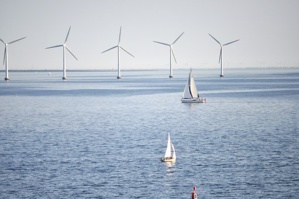Dailycsr.com – 07 May 2018 – The governments of China and the U.K. have come together in a joint venture, whereby supporting five projects in the endeavour of producing the next gen technologies in the “offshore renewable energy”.
The programme, scheduled for a span of “three years”, will tackle with the challenges created by the “offshore wind” along tidal power in an attempt to make use of their “environmental and economic benefits” to the maximum.
Through this research, it is hoped to identify the “best energy resources” available whereby applying the “new technologies” most effectively for strengthening the system in the face of “typhoons and earthquakes”. Furthermore, this research also aims to underscore the sector’s potential when it comes to providing “a stable power supply for island and coastal communities”, mainly focused on China, besides cutting down on uncertainties of “drawing power” from “alternative sources”.
One of the projects in the programme involving “data science and computing” is being carried out by the “Imperial College London and Zhejiang University in eastern China”. This projects aims to design “more economical offshore wind farms”.
The second one is under the scientists of “Oxford and Shanghai Jiao Tong Universities” that focuses on “structural designs” for improving the “resilience of turbines to typhoons”. The third in the series, however, is being led by the “Cranfield University and Harbin Engineering University” and is looking for ways to reduce costs of building and operation in the “offshore installations”. According to Brian Collett:
“The work is backed in the UK by the Engineering and Physical Sciences Research Council, the government funding body, and the Natural Environment Research Council, the main government agency for financing and managing research and training in environmental sciences. Support in China is provided by the National Natural Science Foundation”.
The United Kingdom is contributing around “£4m” in the project while the figures for the “Chinese funding” are “not shown”. In the words of the Energy and Industry Minister” of the U.K., Richard Harrington:
“The UK is a world leader in offshore wind, which helps us meet our climate commitments while we grow the economy and create jobs.”
While, the Chief Executive of the “Engineering and Physical Sciences Research Council”, Professor Philip Nelson, praised the programme highly by saying:
“These new projects bring together some of the leading minds in this field from the UK and China to increase our capacity to generate and distribute affordable, safe, clean energy.”
On the other hand, the Chinese Foundation’s President, Dr Yang Wei talking about the “financial and anti-pollution benefits” of the programme added:
“Further advancing China’s already world-leading renewable energy sector is an integral part of the country’s 13th five-year plan and will help to drive future economic growth and advance the cause of low-carbon development.”
As per government data in 2016, 47% of the electricity in the U.K. were sourced from “clean energy”, while 25% came from various renewable sources like “wind and solar farms and hydroelectric dams and biomass”. While Collett informed that:
“The Westwood Global Energy Group, a London consultancy, has predicted that offshore wind energy capacity throughout the world will increase fivefold in the next seven years”.
References:
http://ethicalperformance.com/
The programme, scheduled for a span of “three years”, will tackle with the challenges created by the “offshore wind” along tidal power in an attempt to make use of their “environmental and economic benefits” to the maximum.
Through this research, it is hoped to identify the “best energy resources” available whereby applying the “new technologies” most effectively for strengthening the system in the face of “typhoons and earthquakes”. Furthermore, this research also aims to underscore the sector’s potential when it comes to providing “a stable power supply for island and coastal communities”, mainly focused on China, besides cutting down on uncertainties of “drawing power” from “alternative sources”.
One of the projects in the programme involving “data science and computing” is being carried out by the “Imperial College London and Zhejiang University in eastern China”. This projects aims to design “more economical offshore wind farms”.
The second one is under the scientists of “Oxford and Shanghai Jiao Tong Universities” that focuses on “structural designs” for improving the “resilience of turbines to typhoons”. The third in the series, however, is being led by the “Cranfield University and Harbin Engineering University” and is looking for ways to reduce costs of building and operation in the “offshore installations”. According to Brian Collett:
“The work is backed in the UK by the Engineering and Physical Sciences Research Council, the government funding body, and the Natural Environment Research Council, the main government agency for financing and managing research and training in environmental sciences. Support in China is provided by the National Natural Science Foundation”.
The United Kingdom is contributing around “£4m” in the project while the figures for the “Chinese funding” are “not shown”. In the words of the Energy and Industry Minister” of the U.K., Richard Harrington:
“The UK is a world leader in offshore wind, which helps us meet our climate commitments while we grow the economy and create jobs.”
While, the Chief Executive of the “Engineering and Physical Sciences Research Council”, Professor Philip Nelson, praised the programme highly by saying:
“These new projects bring together some of the leading minds in this field from the UK and China to increase our capacity to generate and distribute affordable, safe, clean energy.”
On the other hand, the Chinese Foundation’s President, Dr Yang Wei talking about the “financial and anti-pollution benefits” of the programme added:
“Further advancing China’s already world-leading renewable energy sector is an integral part of the country’s 13th five-year plan and will help to drive future economic growth and advance the cause of low-carbon development.”
As per government data in 2016, 47% of the electricity in the U.K. were sourced from “clean energy”, while 25% came from various renewable sources like “wind and solar farms and hydroelectric dams and biomass”. While Collett informed that:
“The Westwood Global Energy Group, a London consultancy, has predicted that offshore wind energy capacity throughout the world will increase fivefold in the next seven years”.
References:
http://ethicalperformance.com/


 The U.K. & China Invest Jointly In Next Gen Technology Development For Offshore Renewable Energy
The U.K. & China Invest Jointly In Next Gen Technology Development For Offshore Renewable Energy





 Companies
Companies